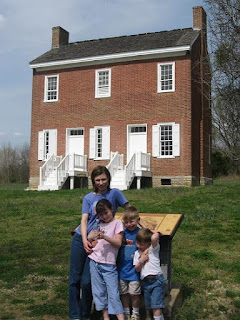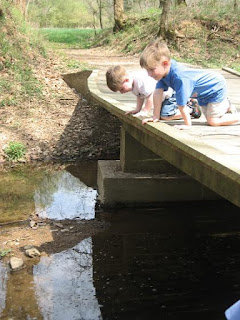
My hero of the Bible is Abraham, plain and simple.
Jenny tells the story of a conversation we had in college. She asked me what my life's goal was, and I told her it was to be a "Patriarch."
I'm not sure what got into me at the time. Perhaps it was a love of history and a fixation on greatness. Part of it must have been the admiration I have for my own grandfather, who anchored my family all of my life and gave me much to emulate in my own life (and much to improve upon, too, I should add).
When I look back on the 15 or so years since I said that to Jenny, I realize that "Patriarch" is about the only college-era goal that I have achieved. I enjoy teaching, but my goals of law school and organizational leadership bit the dust years ago. My writing hasn't taken off. The one job I have done well has been to care for three kids and support Jenny in her own, successful, professional endeavors.
I don't focus on unfulfilled dreams, really, because I sit here surrounded by the luxurious trappings of patriarchy: I live in my grandparents' home, the Dittes family seat for over 50 years; I have positions of ministry within my church and service within my community; I am a father to three kids--Jenny nixed the whole "Twelve Tribes of Dittes" idea years ago, sadly. So when I study the Bible, I study Abraham.
When I saw the title to David Rosenburg's book in my book club, I jumped at the chance to read it. It is an outsider's look at Abraham. Rosenburg brings a strong knowledge of Sumerian literature, and from this base in Sumer (the culture which Abram and his father, Terah, left for Haran). He also speculates on the authors whose versions of the Abraham story became enshrined in our Bible. Finally, he introduces a fascinating concept, the "Cosmic Theater," which encapsulates the inheritance that we draw from Abraham.
I had known little about the culture of Sumer aside from a passing knowledge of "The Epic of Gligamesh." Yet it was one of the world's first great civilizations, carried over from India, whose mountains are represented in its pyramid-like ziggurats. By the time of Abram's birth in 1750 BC, Sumer was in decline, upstaged by Babylonians northwest along the Euphrates River. Under the energetic leadership of Hammurabi, Babylonians had coopted Sumerian culture, while elevating the minor Sumerian god, Markuk, to supremacy.
This revelation highlights one of the real ironies of the Old Testament: it begins in the same way it ends: with the exile of the first Hebrew from his home in Ur--a journey from Sumer to Canaan; and with the exile of the Hebrews from Canaan back to Babylon. It makes the Old Testament a complete idea, doesn't it?
Rosenburg doesn't find the God of the Hebrews among those of Sumer. He describes the Sumerian religious festivals and traditions--their penchant for dressing up their idols and feeding them every day. Rosenburg notes that Sumerians believed in gods who interacted with man: watching us even as mankind scans the heavens trying to understand them. He describes this as the "Cosmic Theater." Abraham and his descendants invented the idea of a God who takes an interest in the individual, interacts with men, and asks people to interact in this theater that transcends dimension, time, and death itself. He believes that Yahweh was a family god in Abraham's family who was elevated by Abram's faith--and who rewarded Abram in return.
(Consider the Egyptian gods, who ruled the sky and the afterlife, yet had little to do with daily life; or the gods of Gilgamesh who try to hide from him the secret to everlasting life.)
Rosenburg has written previously on the authors of the Old Testament. This is an area of theology that I'm not sure of, but Rosenburg makes the case that one author, J, was actually a female scribe in the court of Reheboam. She comes out in the strong female characters of Sarah and Rebekah, and in the unique voice of Abram's faith experiences. She is also a well-educated author, drawing from earlier Hebrew sources for the story of Abraham as well as a library of texts from Sumer and Babylon. She is named "J" because she uses the name "Yahweh" for God (which starts with a J in German, where this theory originated).
The other major author Rosenburg identifies is "E" for "Elohim," an author writing in the northern kingdom of Israel 200 years later. E is concerned with procedure and hierarchy, and he tries to fill in the blanks with numbers (the ages of Abraham and Sarah when they conceived and died). In reading these sections, it occurred to me that we have to realize that we use two lenses to understand history and the Bible: we try to understand these stories using our own cultural parameters, the cultural parameters of the people who wrote down the stories many years after they happened, and finally the factual circumstances that are told in these stories.
Rosenburg mentions one other author of the Abraham story: Isaac. The fact that he plays such a small role in Genesis may imply that he was the one responsible for recording his father's journeys and transmitting them to the next generation. Abraham never gives up the feeling of being an immigrant in Canaan (he buys a field to bury Sarah in, stating explicitly that he has no land of his own). In a way, it was through Isaac that Sumerian culture was transmitted to the Hebrew people and down into our lives today.
As you can see,
Abraham is a pretty ambitious project--trying to connect so many divergent ideas together into the story of one patriarch. At some points, it sags under the weight of its ambition. I would have been satisfied with a mere discussion of Sumerian culture and its echoes in the Old Testament or with a dissertation on J and E and the authors of the Old Testament or a reflection of the history of the "Cosmic Theater." All in all, however, this is a fascinating book, one that I'm happy to add to my collection of Abraham readings.

 Jenny planted these tulips last year around our anniversary. They are coming up along the wall that separates our driveway from the yard. You can see our ivy-dressed garage in the background.
Jenny planted these tulips last year around our anniversary. They are coming up along the wall that separates our driveway from the yard. You can see our ivy-dressed garage in the background.


 A final gift of spring is that violets have just taken over our yard in about five places. These aren't the humble, plain purple violets, either. They are luxurious, proud two-toned purple violets. It's amazing. I love seeing them, but I'm scared to step or mow around my place because of how beautiful these things are.
A final gift of spring is that violets have just taken over our yard in about five places. These aren't the humble, plain purple violets, either. They are luxurious, proud two-toned purple violets. It's amazing. I love seeing them, but I'm scared to step or mow around my place because of how beautiful these things are. Redbuds are the surest signs of spring. On Saturday, they were the only tree-things out. None of the leaves had yet emerged from the trees..
Redbuds are the surest signs of spring. On Saturday, they were the only tree-things out. None of the leaves had yet emerged from the trees.. This brick house was built in 1817 by the Gordon family, who leased rights from the Chickasaw Indians to run a ferry across the nearby Duck River.
This brick house was built in 1817 by the Gordon family, who leased rights from the Chickasaw Indians to run a ferry across the nearby Duck River. Owen and Jo-Jo checked out the minnow and crawdad action in the creek from a safe distance. Life is just bursting out everywhere. The Saturday before it was a blustery 50 degrees. Seven days later, it was 83!
Owen and Jo-Jo checked out the minnow and crawdad action in the creek from a safe distance. Life is just bursting out everywhere. The Saturday before it was a blustery 50 degrees. Seven days later, it was 83! Jenny and Ellie went wading in the creek, but still took time out to look beautiful.
Jenny and Ellie went wading in the creek, but still took time out to look beautiful.

